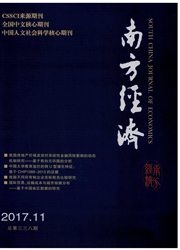

 中文摘要:
中文摘要:
本文依照“禀赋效应——认知幻觉——交易费用”的概念模型,通过一个修正的交易费用分析范式,拟揭示幻觉认知引发的交易费用对农地流转行为的影响。分析表明:(1)未转出农地农户的认知幻觉明显高于有转出行为的农户;(2)农户的保障幻觉、农地用途与增值幻觉均会显著增加农地流转中的交易成本;(3)农户对流转合约的稳定性预期,能够有效促进农地的流转;(4)具有禀赋资本及扩展性能力幻觉的农户,能够改善其农地的转入行为。文章认为,发挥农户的比较优势,在尊重农民意愿的基础上,形成农户农地经营的“退出”与“进入”机制,应该是农地政策的基本取向。
 英文摘要:
英文摘要:
In accordance with the conceptual model of "endowment effect, cognitive illusion, transaction costs" and through a modified transaction costs analysis paradigm, this article attempts to reveal how the transaction costs which caused by cognitive illusion influences the behavior of rural land transfer. It is found that: (1) The cognitive illusion of rural households who have transferred rural land is higher than the ones who haven' t transferred; (2) The rural households' cognitive illusion of security, rural land uses and value -added increases the transaction costs of rural land transfer significantly; (3) The stable expectations of transfer contract can promote the rural households to transfer rural land effectively; ( 4 ) The households who have cognitive illusion of endowment capital and expandable competence can improve their rural land transfer -in behavior. According to the article, it should be a basic policy orientation to give rein to the rural households' comparative advantage, form rural households' "exit" and "enter" land management mechanism on the basis of respecting rural households' willingness.
 同期刊论文项目
同期刊论文项目
 同项目期刊论文
同项目期刊论文
 期刊信息
期刊信息
